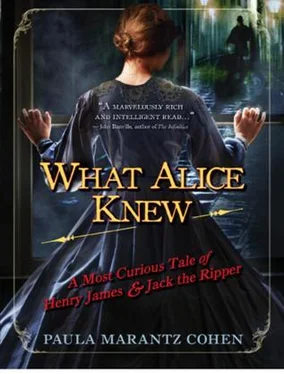“So you want to interrogate a criminal because people associate him with the wrong crimes?” scoffed Abberline.
“I do,” William replied seriously. Indeed, this was precisely the point as he had worked it out.
He had been cultivating an idea on the subject for some time. The perverse impulses that resulted in criminal behavior must, he believed, have utility for the criminal, as a response to trauma or stress that might otherwise be insupportable. The key was to find the context in which the behavior appeared logical, even necessary. William looked down at his fingernails, which had been bitten raw. Wasn’t his compulsion a kind of perversion, developed to keep his demons at bay? In cases of sociopathic perversion, like that of Jack the Ripper, the principle was the same. The murders, in this sense, were like nail biting, only on a spectacular scale, a means by which the killer protected himself against some profoundly debilitating pain.
This idea was behind his determination to speak to Leather Apron. He not only wanted to study the man who had been mistaken for Jack the Ripper; he wanted to ask him for his help. Wouldn’t someone who had terrorized women be in the best position to understand what might propel someone else to do the same? Wouldn’t such a man, mad though he was—indeed, in being mad—know more about the twisted motives of the Whitechapel killer than the most seasoned policeman or psychologist?
These were William’s thoughts, but all he said to Abberline was, “We might learn from one madman how to catch another.”
The inspector surprisingly acquiesced. There was trouble at headquarters, he muttered, and he might as well get out of the office. A trip to Broadmoor would at least be a diversion, if not an especially pleasant or productive one.
As they sat together on the train, finishing their breakfast, Abberline pulled an envelope from his pocket and handed it to William. “This is as good a time as any to show you this,” he said. “It was delivered to headquarters yesterday.”
William looked at the envelope. It was postmarked East London and addressed: “The Boss, Scotland Yard, London City.” Previous Ripper letters, he recalled, had been addressed to “The Boss” at the Central News Agency. He opened the envelope and extracted the paper inside. The writing was a raggedy scrawl.
Tell your professer to keep his nose out or be sory for it.
My minds not disesed but he can get the knif too
if he dont watch out—ha ha.
William stared at the message. “Is it authentic?” he asked softly. He had a sudden recollection of the shove that had sent him careening in front of the curricle on the way to Sidgwick’s club.
Abberline shrugged. “There are points in common with some of the other letters. The paper has the mark of Pirie and Sons, for example. But then, Pirie is a popular stationer in London; no need to make too much of that. And previous letters have been publicized enough to explain the similarity of locution. It’s odd, regardless, that you’re singled out for a joke of this sort. Who do you know who’s aware you’re investigating this case and might have let the word out?”
William furrowed his brow. There were, he realized, plenty of people; Sidgwick and Mrs. Lancaster, to begin with. The Sargents. His brother, Henry, with his general tendency to blab. And something might have come out from their visit to the East End.
“The letter most likely comes from a colleague of yours,” explained Abberline, “perhaps a rival in your line of work, who’s having malicious fun at your expense.”
William could not imagine a colleague doing such a thing, except possibly one of the French.
“As I say, it may be a nasty joke,” continued Abberline, “and chances are, it is. But my advice, Professor, is to take care. Our man is a lunatic, but a cunning one, and if he has his eye on you, I’d make a point to keep out of his way.”
The Broadmoor Criminal Lunatic Asylum was located in a remote terrain on the edge of the Berkshire Moors, thirty miles outside of London. Its only neighbor was an orphanage for wayward boys, society favoring the placement of the madman and the orphan conveniently out of sight of meddlesome politicians and reforming ladies.
The asylum itself was a massive stone structure in which two broad turrets flanking an archway seemed to stand open, like a giant maw, to swallow its occupants. The building’s placement in the ancient moor and the worn look of the gravel path leading up to it made William feel the weight of entrenched and unchanging experience. He could imagine written above the wide arch the lines from Dante’s great poem: “Abandon hope, all ye who enter here.”
Yet Abberline explained that the asylum had been built relatively recently, after a group of altruistic ladies got it into their heads to visit the Bethlehem Asylum in London. The conditions at “Bedlam” had appalled the ladies, and a wave of reform had followed. The result was the construction of more humane asylums like Broadmoor. Of course, a humane asylum was a relative thing. Broadmoor was not squalid or unhealthy in the way that Bedlam had been. There were provisions for proper exercise, diet was regulated, and sanitation was modern enough, but that was the end of it. If the bodies of the inmates were treated better here, their souls were no better tended than they had been before.
Entering through the vast portal, William and Abberline were met by a burly guard who instructed an orderly to take them to the director of the asylum. The orderly had sloping shoulders and a lazy eye and looked to William exactly the way an orderly in a lunatic asylum should look. If, as he had written, “to laugh was to be happy,” then perhaps “to have a lazy eye was to be a lunatic,” or at least, an attendant of lunatics.
They followed the lazy-eyed attendant through a large courtyard, where in one area, a sullen group of men were in the process of taking exercise. Under the supervision of another burly attendant, the inmates were linked arm in arm, walking in rote fashion back and forth. At intervals, someone would break off from this chain and loiter in a corner, at which time the attendant would walk over and strike him on the back of the legs so that the man would scurry back to rejoin the group.
“Do they engage in corporal punishment here, then?” asked William. “I thought it was a humane institution.”
Abberline grunted. “A swat on the legs is humane enough when compared to being pummeled senseless, and I suppose they do that too if they feel the need.”
William stood for a moment watching the inmates, their heads bowed, walking back and forth in a patient shuffle. Were they in identical states of torpor, or were they merely resigned, after months or even years of this routine, to submerge whatever sparks of selfhood they had into private reveries? Once again, he was bothered by the basic philosophical paradox of where the individual began and ended, of how social conditions and personal habits shaped the self, and how the worst aspects of character could be imposed on an individual as the result of the best intentions.
He and Abberline were finally led into a room that had been equipped with some of the amenities of normal society. An effort had been made to add color in the way of a carpet and a variety of bric-a-brac, but the effect was unwelcoming. The room was too large for its furnishings, and a quality of emptiness and desolation prevailed.
In one corner were several armchairs positioned around a low table. In the other corner was a large desk, strewn with papers and files, and behind the desk sat a scholarly-looking man of about William’s age, who rose as they entered and stiffly put out his hand. “Henry Maudsley,” he said. His handshake was overfirm in the manner of someone used to controlling situations, or at least determined to do so.
Читать дальше












